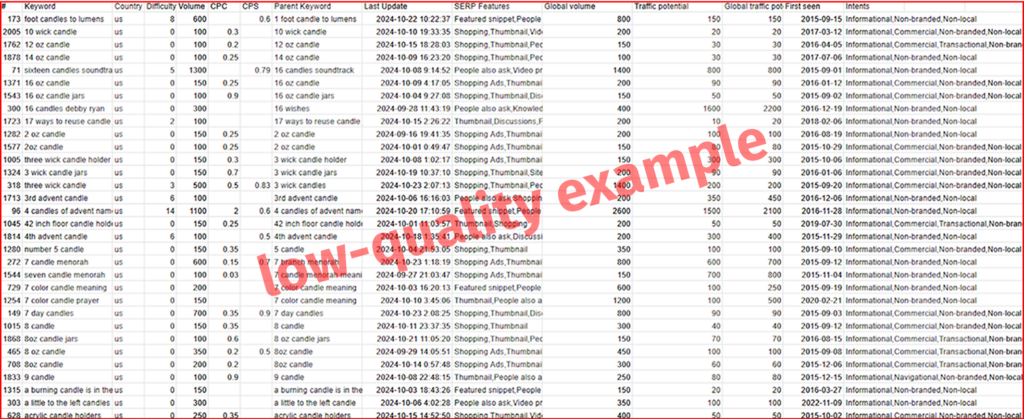Keyword research is an essential part of building an effective SEO strategy. It involves identifying and analyzing the search terms people are using to find information related to your products or services. At Get A Copywriter, we perform advanced keyword research, including an in-depth analysis of keyword competitiveness and opportunities in your niche. Our goal is to ensure you have the insights and guidance you need to drive results.
Why is keyword research important?
Once you understand what keyword phrases are relevant and how to prioritize them, you can supercharge your SEO strategy. Our keyword research experts provide detailed reporting so you can use your keyword research to:
- Better understand what your audience wants
Our keyword research services reveal the search terms your customers are using and the questions they’re asking, helping to inform your content strategy. - Improve your website’s visibility
You can strategically use keyword phrases to rank higher in search engine results pages (SERPs), making your site easier to find online. - Increase conversions
Make your content and landing pages more relevant to your audience with the right keywords, and you can motivate more sales, sign-ups, and other types of conversions. - Boost your marketing ROI
We’ll show you which keywords and topics offer the most value, so you can focus your campaigns and content on what’s most likely to lead to revenue gains.
When should you do keyword research?
Get A Copywriter keyword research services can help with everything from content planning to gaining a competitive edge. If you’re in any of the following boats, keyword research is a smart move:
- You’re creating your content plan: Learn what topics you’re potential customers are interested in to help attract more likely-to-buy site visitors.
- You’re launching a new product or service: Find out how to catch the attention of your audience when marketing your new product.
- You’re building or updating web pages: Ensure your web pages are optimized for search engines and resonate with your audience’s needs and goals.
- You’re trying to get ahead of your competitors in SERPs: Find out what search terms your competitors are ranking for so you can put a plan in place to get ahead in SERPs.
What keyword research reveals
The following are the essentials of keyword research. Get A Copywriter covers all of them and delivers the insights in an easy-to-understand report.
List of target keywords: We use advanced tools to build a comprehensive list of relevant keywords for your website. We include both popular and competitive search terms that relate to your industry niche, brand, and audience needs.
Keyword difficulty (KD): This metric shows you how difficult it is to rank for a particular keyword. We find the KD for each keyword and can offer recommendations on how to outrank web pages already ranking for it. If you have a new site, we’ll start with keywords with a lower KD to build initial traffic.
Search volume analysis: This metric reflects how popular a particular keyword is. We categorize keywords into low, medium, or high volume based on the number of monthly searches so you know what to prioritize.
Searcher’s intent: Understanding what people want to achieve through search can help you craft more relevant blog posts and effective conversion pages. We include the type of search intent for each keyword.
- Informational: Searchers are looking for answers or information.
- Commercial: They are exploring options before buying.
- Transactional: They are ready to make a purchase.
- Navigational: They are trying to find a specific website.
How Get A Copywriter keyword research differs from other services
Most keyword research services miss the mark. We know this first hand.
Years ago, we were in your shoes, looking for a reliable keyword research company to help inform our content and SEO strategies. We tried several options, but the results were never worth the money. So we gave up on outside agencies and decided to create our ideal keyword research service ourselves.
Through this experience, we learned what worked and what didn’t. We developed a deep understanding of what information can truly drive value for a website, and how to distill keyword analysis into actionable insights. Today, we have a highly effective process that digs deeper than other keyword research services.
In-depth understanding of your website’s needs
We start by gathering your details and researching your market, the state of your industry, and your competitors. That enables us to set the stage for effective keyword research.
Here’s what we ask for from you:
Website
Please provide a link to the website you want keyword research for.
Primary services or products
List the primary services and products you want to rank for in search engine results pages (SERPs). If you are only interested in informational queries for a blog, please indicate this and list the main topics you want to rank for. This helps us focus on the most relevant keywords.
Main competitor websites
List the main competitors who are already successfully ranking for your topics, ideally the top 3 websites for your most important keywords. If you’re unsure about specific competitors, we can identify them for you. We will verify your main competitors, but we’re also interested in seeing which competitor websites you want to model your content after and outrank.
Target suburb, city, state, or country
Indicate the region you want to rank in for your keywords. This is particularly important for projects focused on specific geographic areas (e.g. if your business only provides services in Canada or sells products within certain regions). The same keyword may have different search volume and competition metrics depending on the location, so setting the correct location will help us gather more relevant data.
Additional details
Specify any details you want us to know. For example, you may want to exclude certain keywords that, while generally relevant, do not suit your business. If your business offers premium services, you might want to exclude keywords with terms like “budget” or “cheap” to avoid attracting the wrong audience. Such details help make keyword selection more targeted.

Initial keyword data collection
At this stage, we begin collecting primary data — the main phrases we’ll focus on when conducting keyword research:
- We gather commonly used search phrases using advanced keyword research tools, including Ahrefs. Our initial gathering includes broad queries and more nuanced yet potentially high-value search terms.
- We analyze your competitors’ websites to look for keyword phrases they’re using and to analyze what phrases and keyword usage approaches are working well in your niche.
- We weed out the keywords that aren’t relevant.
- After honing in on the keywords that matter, we determine the approximate keyword difficulty (KD) worth pursuing based on your goals and website data, including your current domain rating (DR), a metric that reveals your website domain’s authority.
After building your keyword data and determining what to prioritize, we create a final list of core phrases for further research. Other agencies don’t go any further. They hand over a list of keyword phrases with KD, search volume, and search intent. But no meaningful insights or recommendations. You might get something like this:

This is the actual keyword research we received from a client
That’s where Get A Copywriter stands out. We don’t just provide keyword data and lists. We give you actionable insights and recommendations to help you get results.
After building a list that’s tailored to your business goals, primed to resonate with your target audience, and ready to help your website climb in SERPs, we’re not done. Next, we analyze the keywords so we can give you the information you need for a solid content strategy.
We use clustering and to reveal the why behind your keywords
Clustering involves grouping keywords based on their meaning and intent. This process allows us to group the keywords based on user needs and goals, so you know where to use them in your content strategy.
Keyword research example from Get A Copywriter

How we group keywords:
Topic and category
Grouping by topic can guide your content planning. For example, keywords related to “self-storage” may include terms like “how to rent a storage unit” or “furniture storage for relocation.”
You can build blog posts and other content based on these content topics, identify internal linking opportunities, and ensure you’re giving your audience what they’re interested in, as well as the information they need to solve their problems.
User intent
We categorize keywords based on the implied intent of the phrase. For example, is someone looking for information, or are they ready to make a purchase? “How to organize small apartment storage” is an informational query. “Rent storage space” is a transactional query — someone entering this search term into Google is ready to buy.
- Informational queries – The user is searching for information.
- Commercial queries – The user is considering a purchase or comparing options.
- Transactional queries – The user is ready to make a purchase or take another action.
- Navigational queries – The user is already familiar with your brand and is trying to navigate to your website.
This helps you ensure you have content for the different stages of the buyer’s journey. When your content aligns with user’s needs, you can attract higher-quality traffic.
Volume and keyword difficulty (KD)
Grouping by volume and KD (low, medium, high, and very high) helps you prioritize content.
High volume, low KD terms are opportunities to drive organic traffic to your site quickly. You’ll also want to create content for phrases with high keyword difficulty and low volume to ensure you’re taking advantage of the keyword opportunities in your industry niche.
Required backlinks
We use Ahrefs data to estimate the number of backlinks you might need to rank in the top 10 for each keyword. You can use this information to inform your backlink strategy and to help prioritize keywords.
Bringing it all together
After grouping the keywords, we perform a final review, ensuring all keywords are in the correct clusters and removing any irrelevant terms.
Then, we create recommendations for content topics based on the top-ranking pages for your keywords. You’ll get a primary keyword for each topic we list in your report and an explanation of why that keyword was chosen. We also suggest related keywords to help drive more traffic.
And finally: prioritization. We set keyword priorities to help guide your strategy. You’ll know what topics to start building content for, which ones to save for later, and how to view your content topics holistically to create an effective content strategy that attracts the right traffic and helps to drive conversions.
You walk away with a fully clustered, organized keyword core with keywords, volumes, KD, search intent, suggested page topics, and set priorities.

Your keyword report might be on a single sheet. If a high number of keywords are relevant to your niche, or if a more in-depth analysis is required, we divide the results across multiple tabs in your document. If that’s the case, we’ll make this clear when delivering your report.
Ready to dominate your niche with powerful keywords?
Book a consultation today, and let us help uncover the high-impact keywords that will elevate your website and drive targeted traffic.
Feb 05, 2025


Andy Zenkevich
Andy is a seasoned CEO with years of hands-on experience in SEO, link building, content marketing and website development. His deep understanding of the digital landscape and passion for content marketing make him a trusted voice in the industry.